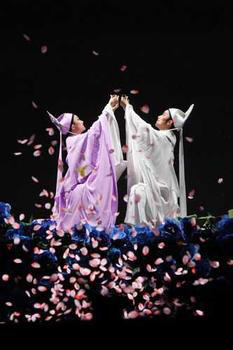What happens when Brecht meets Chinese Yue Opera?
When Bertolt Brecht wrote The Good Person of Szechwan, he had never traveled to China. More likely, the location of the play, Sichuan, was chosen to support his "epic theatre" approach to directing, which aims to create an emotional distance between the audience and the drama being viewed.
Now, more than 70 years after first being performed in 1942, the Zhejiang Xiaobaihua Yue Opera Troupe has adapted the morality tale. But this time, the good person is from South Yangzi. Their production, Good Soul of South Yangtze, was staged last week at the National Centre for the Performing Arts (NCPA) in Beijing.
Yue Opera was born in the late 19th century in Shaoxing, Zhejiang Province. It was later turned into an art form where female performers play all the roles. With repertoire works such as The Romance of the West Chamber, The Butterfly Lovers and Wrong Red Silk, most productions feature romantic storylines, and the all-female cast specializes in a soft and exquisite singing style.
So, what is the result of the combination of Brecht and Chinese Yue Opera?

New concept
At the beginning of the show, one of the gods says, "The script says we should look for a good person in Sichuan. Never mind, Jiangnan also has many good souls."
On stage, clothes for a man and a woman are hanging up. Suddenly, all the actors enter dancing and wearing pure white costumes. The two sets of hanging clothes disappear while two lines of different outfits come down for each actor to wear. This first scene, as people familiar with the Brecht version may know, is the search for a good person.
Three gods arrive in Zhejiang, looking for a good soul to help people. After many rejections, Shen Dai, a prostitute, offers a place for the gods to stay. In return, the gods chose her to be the one to carry the humanitarian responsibility.
Shen is given money to open a silk shop. Unfortunately, the shop only brings her poor and lazy neighbors and relatives one after another. To solve the problem, Shen sometimes disguises herself as a male cousin, Sui Da. When people accuse Sui of murdering Shen, the poor woman finally reveals her true identity as well as the two sides of her nature.
"The Life of Pi used animals to talk about human nature whereas here the switching between man and woman is also a tool in the discussion of human nature," said Mao Weitao, the leading performer in the show as well as the director of Zhejiang Xiaobaihua Yue Opera Troupe.
Mao is a legend in contemporary Yue Opera. Trained to play xiaosheng (young male), she had never played a woman in her 33-year performing experience. In this show, for the first time, she must wear a dress.
For audiences who are familiar with Yue Opera, there are many surprises: the use of modern language in the dialogue, a weaving machine, water pipes, suits and qipao, and miscellaneous things remembered by Mao and other people living in South Yangtze during the last century.
These elements are new to Yue Opera audiences who are accustomed to ancient Chinese costumes and settings.
